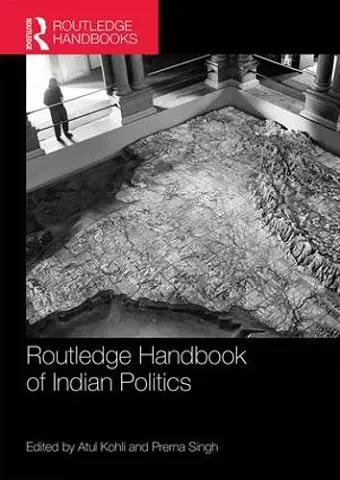Routledge Handbook of Indian Politics
Atul Kohli editor Prerna Singh editor
Format:Paperback
Publisher:Taylor & Francis Ltd
Published:1st Mar '16
Currently unavailable, and unfortunately no date known when it will be back
This paperback is available in another edition too:
- Hardback£230.00(9780415776851)

India’s growing economic and socio-political importance on the global stage has triggered an increased interest in the country. Now available in paperback, this Handbook is a reference guide, which surveys the current state of Indian politics and provides a basic understanding of the ways in which the world’s largest democracy functions.
The Handbook is structured around four main topics: political change, political economy, the diversity of regional development, and the changing role of India in the world. Chapters examine how and why democracy in India put down firm roots, but also why the quality of governance offered by India’s democracy continues to be low. The acceleration of economic growth since the mid-1980s is discussed, and the Handbook goes on to look at the political and economic changes in selected states, and how progress across Indian states continues to be uneven. It concludes by touching on the issue of India’s international relations, both in South Asia and the wider world.
The Handbook offers an invigorating initiation into the seemingly daunting and complex terrain of Indian politics. It is an invaluable resource for academics, researchers, policy analysts, and graduate and undergraduate students studying Indian politics.
This coedited handbook navigates major themes of Indian history to explain Indian politics, political-economy, regional development, and India’s role in international relations. The analysis in part 1 covers the context of India’s colonization; key Indian leaders and their legacies; the dynamics of India’s political institutions centering on democracy, centralization-decentralization, ideologies of nationalism, secularism, and Hindu fundamentalism; and the "politics of empowerment" within India’s lower caste system. In part 2 contributors address India’s political economy, namely, its shift from a "reluctant" to an "enthusiastic" pro-capitalist state, and assert that this shift (evidenced in a "state-capital alliance" and the growing power of business groups) leaves much to be done in the areas of poverty removal, land redistribution, primary education, and public health. Part 3 addresses the diversity of India’s regional development involving roles of some "neo-patrimonial" governments and "authority structures" in this process. Part 4 analyzes India’s role in the regional and world arena (including international migration and its consequences for India) through the lens of India’s colonial past, nationalist, and world visions—which are also being shaped by ideational and structural factors of strategic interdependence. In pointing to new directions of thinking and research in these contexts, the handbook shows how power distribution in the society is constantly being negotiated and renegotiated.
--R. Das, University of Minnesota-Duluth
Summing Up: Highly recommended. Upper-division undergraduates through faculty.
ISBN: 9781138679191
Dimensions: unknown
Weight: 760g
394 pages